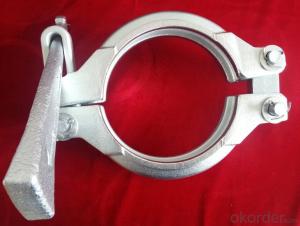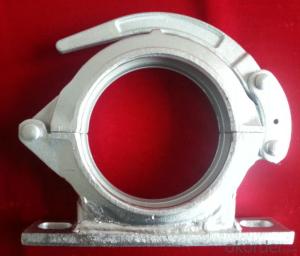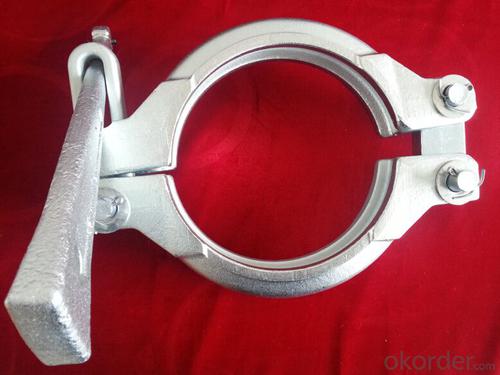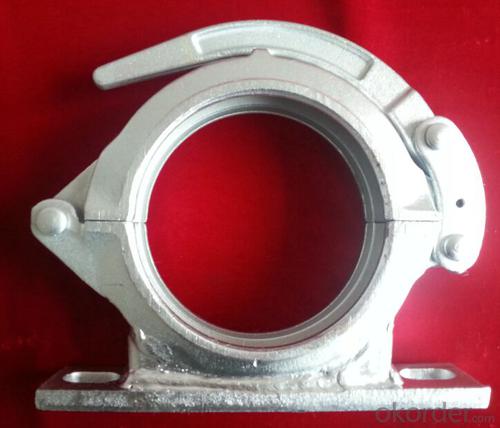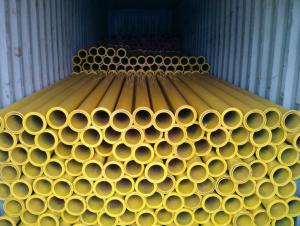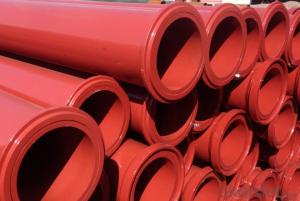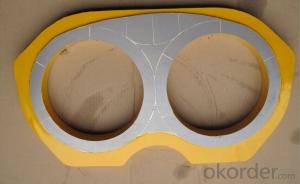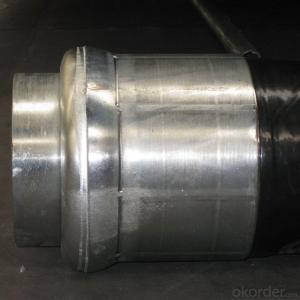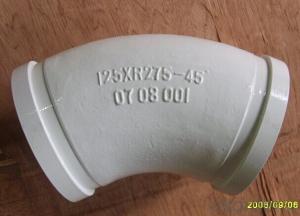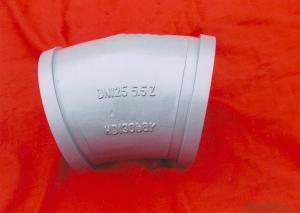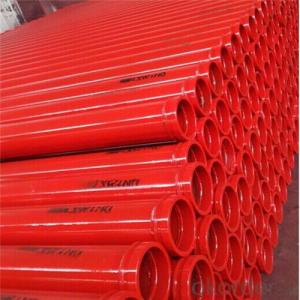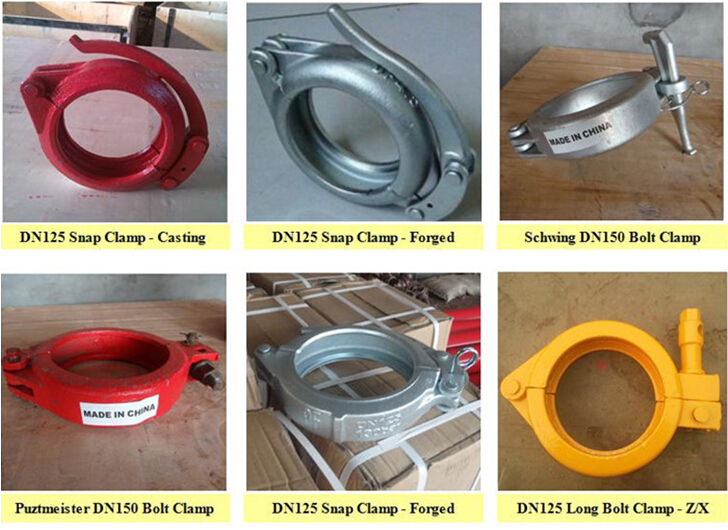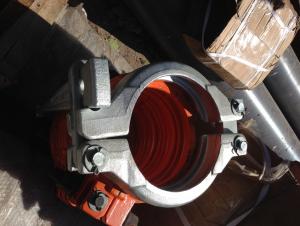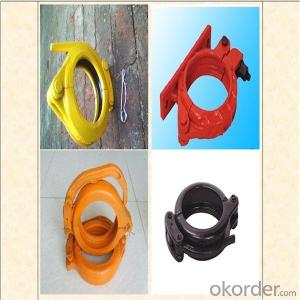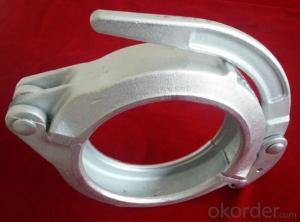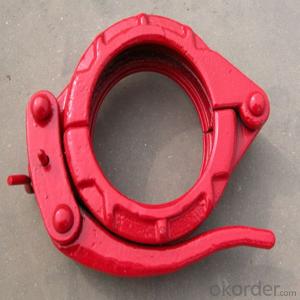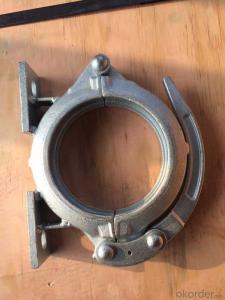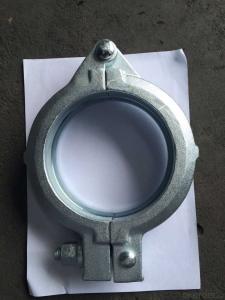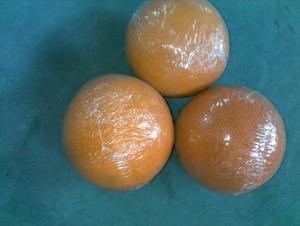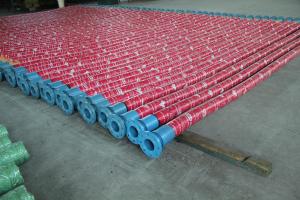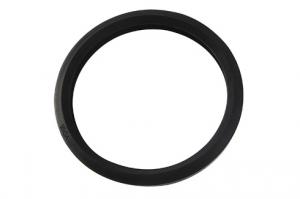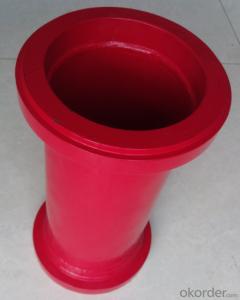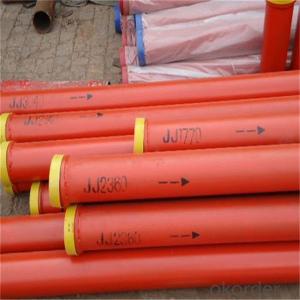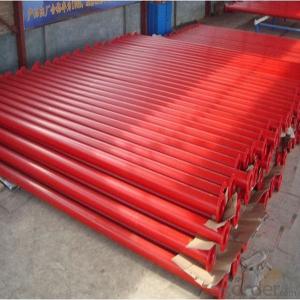Concrete Pump Clamp Snap Coupling DN125
- Loading Port:
- Tianjin
- Payment Terms:
- TT or LC
- Min Order Qty:
- 10 pc
- Supply Capability:
- 10000 pc/month
OKorder Service Pledge
OKorder Financial Service
You Might Also Like
Product Description:
Name:CONCRETE PUMP CLAMP SNAP Coupling DN125
Type: Snap coupling, Bolt coupling, Wedge Coupling, adjustable or mounting type
Dimensions: DN125, 5" DN150, 6'';
Process: Casting or Forging.
Surface treatment: Painted or Galvanized.
Notes: total series of concrete pump clamp for different brand concrete pump(PUTZMEISTER, SCHWING, CIFA, SANY, ZOOMLION, IHI, KYOKUTO Etc) available from us, such as Snap coupling, Bolt coupling, Wedge Coupling, adjustable or mounting type .
Scope of Application of the Equipment
CONCRETE PUMP CLAMP SNAP Coupling DN125widely used on concrete pump truck, concrete placing boom, trailer concrete pump etc, for concrete delivery pipe connection.
Our concrete pump clamps have been successfully exported to many countries from 1998, Our main markets as below: Middle East, Southeast Asia, America, Brazil, Italy, Russia, South Africa etc
Aiming at the largest concrete pump parts manufacturer, and reliable, professional supplier in China, we can supply concrete pump elbows, delivery pipes, casting or forging couplings, end rubber hoses, rubber pistons, tungsten wear plates, delivery cylinders, and other hydraulic parts, one stop service for your concrete pump parts and accessory business.
Product Advantages:
Forged Snap Coupling DN125 are durable, strong, and resists corrosion.
Main Product Features:
· Premium quality
· Prompt delivery & seaworthy packing (10-20 days after receiving deposit)
Reliable performance
Easy and smooth operation
High safety.
· Professional Service
· Competitive pricing
Product Specifications:
Every 300pcs put in one seaworthy wooden box, and 20 boxes in one 20feet container.
FAQ:
Q1: Why buy Materials & Equipment from us?
A1: All products are through its ISO certifications, adhere to the highest standards and a commitment to supply chain safety and customer satisfaction.
Q2: How do we guarantee the quality of our products?
A2: We have established an advanced quality management system which conducts strict quality tests at every step, from raw materials to the final product. At the same time, we provide extensive follow-up service assurances as required.
Q3: How soon can we receive the product after purchase?
A3: Within three days of placing an order, we will begin production. The specific shipping date is dependent upon international and government factors, but is typically 10 to 30 workdays.
Q4: If we can produce some CONCRETE PUMP CLAMP SNAP Coupling DN125 according to customers request?
A4: Yes, we can produce CONCRETE PUMP CLAMP SNAP Coupling DN125 according to the difference country situations and different concrete pump to make it suitable to the market and customers. We have very professional technical team to make the design.
Q5: How to make a quick resolution for after service?
A5:We have overseas branches all-around of world, IF needed, the seller shall dispatch 2 engineers to the buyer's site for supervision of training. The buyer shall make available of necessary facilities &skilled personnel at site for training.
Images:
- Q: Are there any specific maintenance requirements for concrete pump spare parts?
- Concrete pump spare parts have specific maintenance requirements that must be met to ensure optimal performance and prolong their lifespan. To achieve this, regular inspection and maintenance are necessary. Here are some key maintenance requirements for concrete pump spare parts: 1. Cleaning: It is important to regularly clean concrete pump spare parts such as pipes, hoses, and valves to remove any accumulated debris, hardened concrete, or contaminants. This can be accomplished by using appropriate cleaning agents and tools. 2. Lubrication: To minimize friction and wear, it is crucial to properly lubricate moving parts like pistons, cylinders, and bearings. It is recommended to use lubricants specifically designed for concrete pump spare parts, following the manufacturer's guidelines. 3. Inspection: Conduct regular inspections of all spare parts to identify signs of wear, damage, or misalignment. This includes checking for cracks, leaks, loose connections, or excessive wear in seals, O-rings, and gaskets. 4. Replacement: Promptly replace any damaged or worn-out spare parts to prevent further damage or potential breakdown of the concrete pump. It is essential to use genuine spare parts recommended by the manufacturer to ensure compatibility and performance. 5. Storage: When not in use, store concrete pump spare parts in a clean and dry environment to prevent corrosion or damage. Utilize proper storage racks or containers to keep the parts organized and protected. 6. Training: Adequately train operators and maintenance personnel on the correct handling, maintenance, and replacement procedures for concrete pump spare parts. This ensures that maintenance tasks are carried out correctly and efficiently. By adhering to these maintenance requirements, concrete pump spare parts can be maintained in excellent working condition, guaranteeing reliable and efficient operation of the concrete pump system. Regular maintenance not only helps prevent unexpected breakdowns but also enhances the overall performance and longevity of the spare parts.
- Q: Are there any specific guidelines for the installation of pistons or cylinders in concrete pump spare parts?
- Yes, there are specific guidelines for the installation of pistons or cylinders in concrete pump spare parts. These guidelines are important to ensure proper functioning and longevity of the equipment. 1. Clean and inspect: Before installing pistons or cylinders, it is crucial to thoroughly clean and inspect them for any damage or defects. Any debris or contaminants should be removed to prevent potential issues during operation. 2. Lubrication: Apply a suitable lubricant to the piston or cylinder to reduce friction and ensure smooth movement. This will also help in preventing wear and tear, enhancing the lifespan of the parts. 3. Alignment: Proper alignment of the piston or cylinder is essential. Ensure that the piston is aligned correctly with the cylinder bore to avoid any binding or excessive wear. This can be achieved by following the manufacturer's instructions or consulting a professional if necessary. 4. Torque specifications: It is important to tighten the bolts or fasteners according to the manufacturer's recommended torque specifications. Over-tightening or under-tightening can lead to problems such as leaks or mechanical failure. 5. Sealing: Use appropriate sealing materials, such as gaskets or O-rings, to ensure a proper seal between the piston and cylinder. This will prevent fluid leakage and maintain the efficiency of the equipment. 6. Testing: After installation, it is recommended to test the pistons or cylinders to ensure they are functioning correctly. This can involve performing a trial run or conducting pressure tests to check for any leaks or abnormalities. Following these guidelines will help ensure the proper installation of pistons or cylinders in concrete pump spare parts, leading to reliable and efficient operation of the equipment. It is always advisable to refer to the manufacturer's instructions or seek professional assistance if there are any doubts or concerns during the installation process.
- Q: Are there any specific guidelines for the installation of wear plates or cutting rings in concrete pump spare parts?
- Yes, there are specific guidelines for the installation of wear plates and cutting rings in concrete pump spare parts. These guidelines are important to ensure the proper functioning and longevity of the pump. 1. Firstly, it is important to clean the surface where the wear plate and cutting ring will be installed. Any debris, dust, or old material should be removed to ensure a smooth and secure fit. 2. The wear plate and cutting ring should be inspected for any damage or defects before installation. Any parts that are worn out or damaged should be replaced to avoid any potential issues during operation. 3. Apply a thin layer of lubricant or grease to the surface where the wear plate and cutting ring will be installed. This will help with the alignment and ease of installation. 4. Carefully align the wear plate and cutting ring with the designated slots or grooves in the concrete pump. It is crucial to ensure that they are accurately positioned to avoid misalignment or premature wear. 5. Use appropriate tools or equipment to secure the wear plate and cutting ring in place. This may involve tightening bolts, screws, or other fasteners. It is important to follow the manufacturer's instructions and torque specifications to ensure proper installation. 6. After installation, perform a visual inspection to ensure that the wear plate and cutting ring are securely in place and properly aligned. Any signs of misalignment or loose parts should be addressed immediately. 7. Regular maintenance and inspection of the wear plates and cutting rings are essential to identify any signs of wear or damage. It is recommended to follow the manufacturer's recommendations for maintenance intervals and replacement schedules. By following these specific guidelines, you can ensure the proper installation and function of wear plates and cutting rings in concrete pump spare parts, leading to improved performance and extended lifespan of the equipment.
- Q: What are the types, classifications and specifications of concrete pump?
- According to the ability of mixing materials, select the range of output; according to the aggregate of pumping concrete, select the form of the distribution valve
- Q: How does a hopper vibrator prevent concrete blockages?
- A hopper vibrator prevents concrete blockages by vibrating the hopper, which helps to dislodge any stuck or compacted material, allowing it to flow freely through the hopper and preventing blockages.
- Q: Is the main pump of the concrete pump electric control or hydraulic control?
- Closed main oil pump behind the charge pump to provide a constant pressure to the displacement of the electromagnet by the current control output pressure to achieve the main pump pressure and pumping the commutation.
- Q: Are there any specific guidelines for the installation of control panels or electronic components in concrete pump spare parts?
- Yes, there are specific guidelines for the installation of control panels or electronic components in concrete pump spare parts. When installing control panels or electronic components in concrete pump spare parts, it is important to consider the following guidelines: 1. Protection from Moisture: Concrete pump spare parts are exposed to moisture, which can be detrimental to electronic components. It is advisable to install control panels or electronic components in waterproof or moisture-resistant enclosures to prevent damage from water or humidity. 2. Vibration and Shock Absorption: Concrete pump spare parts are subject to vibration and shock during operation. To prevent damage to control panels or electronic components, it is recommended to use shock-absorbing mounts or vibration-resistant enclosures to minimize the impact of these forces. 3. Temperature Control: Concrete pump spare parts can be exposed to extreme temperatures, both hot and cold. It is crucial to ensure that control panels or electronic components are installed in a temperature-controlled environment. This may involve using insulation or cooling systems to maintain a suitable operating temperature range. 4. Wiring and Connections: Proper wiring and connections are essential for the functioning of control panels or electronic components. It is important to follow the manufacturer's instructions and guidelines for wiring, ensuring that connections are made securely and that proper insulation and protection are provided to prevent short circuits or electrical hazards. 5. Accessibility and Maintenance: Control panels or electronic components should be installed in a manner that allows easy accessibility for maintenance and repairs. It is recommended to leave enough space around the components for easy inspection, servicing, and replacement if necessary. By adhering to these guidelines, the installation of control panels or electronic components in concrete pump spare parts can be done in a manner that ensures their long-term functionality and durability.
- Q: How long do concrete pump rubber hoses typically last?
- Concrete pump rubber hoses typically last around 1 to 5 years, depending on various factors such as usage, maintenance, and environmental conditions.
- Q: What is the importance of a good quality concrete pump seal?
- A good quality concrete pump seal is important because it helps to prevent leakage and ensure the smooth and efficient operation of the pump. It helps to maintain the pressure and flow of the concrete, reducing the risk of blockages or malfunctions. A reliable seal also extends the lifespan of the pump by minimizing wear and tear on the internal components. Ultimately, a good quality concrete pump seal is crucial for achieving high-quality and consistent results in construction projects.
- Q: Can concrete pump spare parts be coated with corrosion inhibitors for long-term storage?
- Yes, concrete pump spare parts can be coated with corrosion inhibitors for long-term storage. Corrosion inhibitors are chemicals that can be applied to metal surfaces to prevent or minimize the corrosion process. By applying a corrosion inhibitor coating on concrete pump spare parts, it can create a protective layer that prevents moisture and oxygen from coming into contact with the metal, thus reducing the risk of corrosion. This is particularly important for long-term storage, as the spare parts may be exposed to harsh environmental conditions or stored in damp areas. The corrosion inhibitor coating can help to extend the lifespan of the spare parts and ensure they remain in good condition until they are needed for use.
Send your message to us
Concrete Pump Clamp Snap Coupling DN125
- Loading Port:
- Tianjin
- Payment Terms:
- TT or LC
- Min Order Qty:
- 10 pc
- Supply Capability:
- 10000 pc/month
OKorder Service Pledge
OKorder Financial Service
Similar products
Hot products
Hot Searches
Related keywords
